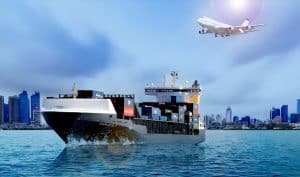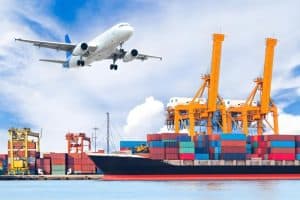Definition of sea freight
International ocean freight, also known as maritime shipping, refers to the transportation of goods between ports in different countries and regions via sea routes. This method includes various modes such as container transport, bulk cargo shipping, liquid cargo delivery, and roll-on/roll-off services.
Ocean transport accounts for more than two-thirds of global trade volume, and approximately 90% of China’s import and export goods are moved through this method, making sea freight the most significant form of transportation in international logistics.

Scope of application for sea freight
Sea freight is ideal for transporting bulk and low-value goods such as ore, coal, grain, crude oil, chemicals, and machinery. It is also a practical option for shipments that have longer logistics cycles and do not require high transportation speed.
The advantages of sea transportation
1. Huge transportation capacity: Sea freight can carry hundreds of thousands of tons of goods, far exceeding road and air transportation, making it the most powerful mode of transportation.
2. Low shipping costs: Due to the fact that port equipment is generally built by the government and ships are durable, the transportation cost of goods is relatively low, especially for large cargo.
3. Strong adaptability: Sea freight can almost adapt to the transportation of various goods, including liquids, powders, paste like items, cosmetics, electrified products, etc.
4. The waterways extend in all directions: The transportation channels for sea transportation generally do not need to be separately established, so the selection of transportation routes is more diversified, and the transportation routes can be changed at any time according to changes in demand.
Disadvantages of sea transportation
1. Slow speed: Compared to other modes of transportation, sea freight has a slower speed.
2. High risk: There is a risk of natural disasters and accidents during maritime navigation, which may result in cargo loss.
3. The sailing date is not easy to be accurate: Due to the influence of natural conditions and sea conditions, the sailing date for sea transportation may not be accurate enough.
Conclusion
Sea freight, this steady giant, plays a crucial role in international logistics. With his broad mind, he carries countless dreams and is the best partner for bulk cargo and long-term planning. Although his pace is slow, his capacity is huge and the cost is relatively low. Under the escort of sea transportation, your goods will sail steadily to every corner of the world in an affordable manner.
To choose sea freight correctly, we must fully understand its features. It is essential to know both its advantages and limitations. By selecting the most suitable transportation method, we can effectively reduce costs. This also ensures smooth and efficient movement of goods across global routes. With the right choice, we can achieve the best shipping performance.
Honza International Logistics has been researching international transportation for 12 years and has rich experience. It is an Alibaba authorized logistics supplier audited by SGS and a member of JCTRANS. Our business scope covers the whole world, including Australia, New Zealand, the United States, the United Kingdom, Germany, Saudi Arabia, Qatar, and Southeast Asia. Choosing Honza International Logistics can provide you with competitive prices and one-on-one professional services.



